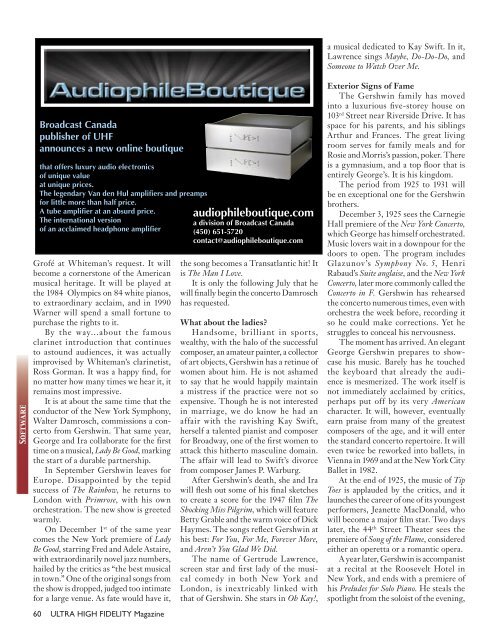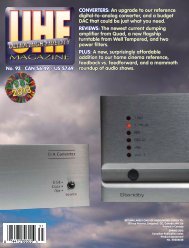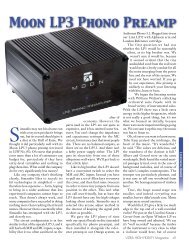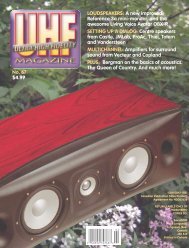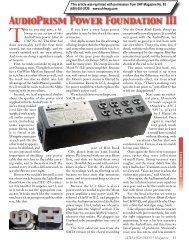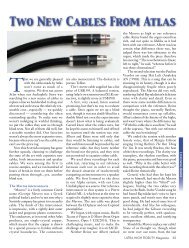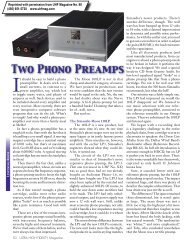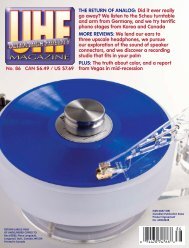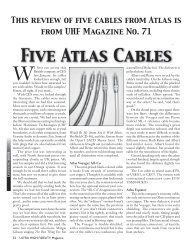UHF No 70 (Net).indd - Ultra High Fidelity Magazine
UHF No 70 (Net).indd - Ultra High Fidelity Magazine
UHF No 70 (Net).indd - Ultra High Fidelity Magazine
Create successful ePaper yourself
Turn your PDF publications into a flip-book with our unique Google optimized e-Paper software.
Software<br />
Broadcast Canada<br />
publisher of <strong>UHF</strong><br />
announces a new online boutique<br />
that offers luxury audio electronics<br />
of unique value<br />
at unique prices.<br />
The legendary Van den Hul amplifi ers and preamps<br />
for little more than half price.<br />
A tube amplifi er at an absurd price.<br />
The international version<br />
of an acclaimed headphone amplifi er<br />
Grofé at Whiteman’s request. It will<br />
become a cornerstone of the American<br />
musical heritage. It will be played at<br />
the 1984 Olympics on 84 white pianos,<br />
to extraordinary acclaim, and in 1990<br />
Warner will spend a small fortune to<br />
purchase the rights to it.<br />
By the way…about the famous<br />
clarinet introduction that continues<br />
to astound audiences, it was actually<br />
improvised by Whiteman’s clarinetist,<br />
Ross Gorman. It was a happy fi nd, for<br />
no matter how many times we hear it, it<br />
remains most impressive.<br />
It is at about the same time that the<br />
conductor of the New York Symphony,<br />
Walter Damrosch, commissions a concerto<br />
from Gershwin. That same year,<br />
George and Ira collaborate for the fi rst<br />
time on a musical, Lady Be Good, marking<br />
the start of a durable partnership.<br />
In September Gershwin leaves for<br />
Europe. Disappointed by the tepid<br />
success of The Rainbow, he returns to<br />
London with Primrose, with his own<br />
orchestration. The new show is greeted<br />
warmly.<br />
On December 1 st of the same year<br />
comes the New York premiere of Lady<br />
Be Good, starring Fred and Adele Astaire,<br />
with extraordinarily novel jazz numbers,<br />
hailed by the critics as “the best musical<br />
in town.” One of the original songs from<br />
the show is dropped, judged too intimate<br />
for a large venue. As fate would have it,<br />
60 ULTRA HIGH FIDELITY <strong>Magazine</strong><br />
audiophileboutique.com<br />
a division of Broadcast Canada<br />
(450) 651-5720<br />
contact@audiophileboutique.com<br />
the song becomes a Transatlantic hit! It<br />
is The Man I Love.<br />
It is only the following July that he<br />
will fi nally begin the concerto Damrosch<br />
has requested.<br />
What about the ladies?<br />
Handsome, brilliant in sports,<br />
wealthy, with the halo of the successful<br />
composer, an amateur painter, a collector<br />
of art objects, Gershwin has a retinue of<br />
women about him. He is not ashamed<br />
to say that he would happily maintain<br />
a mistress if the practice were not so<br />
expensive. Though he is not interested<br />
in marriage, we do know he had an<br />
affair with the ravishing Kay Swift,<br />
herself a talented pianist and composer<br />
for Broadway, one of the fi rst women to<br />
attack this hitherto masculine domain.<br />
The affair will lead to Swift’s divorce<br />
from composer James P. Warburg.<br />
After Gershwin’s death, she and Ira<br />
will fl esh out some of his fi nal sketches<br />
to create a score for the 1947 fi lm The<br />
Shocking Miss Pilgrim, which will feature<br />
Betty Grable and the warm voice of Dick<br />
Haymes. The songs refl ect Gershwin at<br />
his best: For You, For Me, Forever More,<br />
and Aren’t You Glad We Did.<br />
The name of Gertrude Lawrence,<br />
screen star and fi rst lady of the musical<br />
comedy in both New York and<br />
London, is inextricably linked with<br />
that of Gershwin. She stars in Oh Kay!,<br />
a musical dedicated to Kay Swift. In it,<br />
Lawrence sings Maybe, Do-Do-Do, and<br />
Someone to Watch Over Me.<br />
Exterior Signs of Fame<br />
The Gershwin family has moved<br />
into a luxurious fi ve-storey house on<br />
103 rd Street near Riverside Drive. It has<br />
space for his parents, and his siblings<br />
Arthur and Frances. The great living<br />
room serves for family meals and for<br />
Rosie and Morris’s passion, poker. There<br />
is a gymnasium, and a top fl oor that is<br />
entirely George’s. It is his kingdom.<br />
The period from 1925 to 1931 will<br />
be en exceptional one for the Gershwin<br />
brothers.<br />
December 3, 1925 sees the Carnegie<br />
Hall premiere of the New York Concerto,<br />
which George has himself orchestrated.<br />
Music lovers wait in a downpour for the<br />
doors to open. The program includes<br />
Glazunov’s Symphony <strong>No</strong>. 5, Henri<br />
Rabaud’s Suite anglaise, and the New York<br />
Concerto, later more commonly called the<br />
Concerto in F. Gershwin has rehearsed<br />
the concerto numerous times, even with<br />
orchestra the week before, recording it<br />
so he could make corrections. Yet he<br />
struggles to conceal his nervousness.<br />
The moment has arrived. An elegant<br />
George Gershwin prepares to showcase<br />
his music. Barely has he touched<br />
the keyboard that already the audience<br />
is mesmerized. The work itself is<br />
not immediately acclaimed by critics,<br />
perhaps put off by its very American<br />
character. It will, however, eventually<br />
earn praise from many of the greatest<br />
composers of the age, and it will enter<br />
the standard concerto repertoire. It will<br />
even twice be reworked into ballets, in<br />
Vienna in 1969 and at the New York City<br />
Ballet in 1982.<br />
At the end of 1925, the music of Tip<br />
Toes is applauded by the critics, and it<br />
launches the career of one of its youngest<br />
performers, Jeanette MacDonald, who<br />
will become a major fi lm star. Two days<br />
later, the 44 th Street Theater sees the<br />
premiere of Song of the Flame, considered<br />
either an operetta or a romantic opera.<br />
A year later, Gershwin is accompanist<br />
at a recital at the Roosevelt Hotel in<br />
New York, and ends with a premiere of<br />
his Preludes for Solo Piano. He steals the<br />
spotlight from the soloist of the evening,


